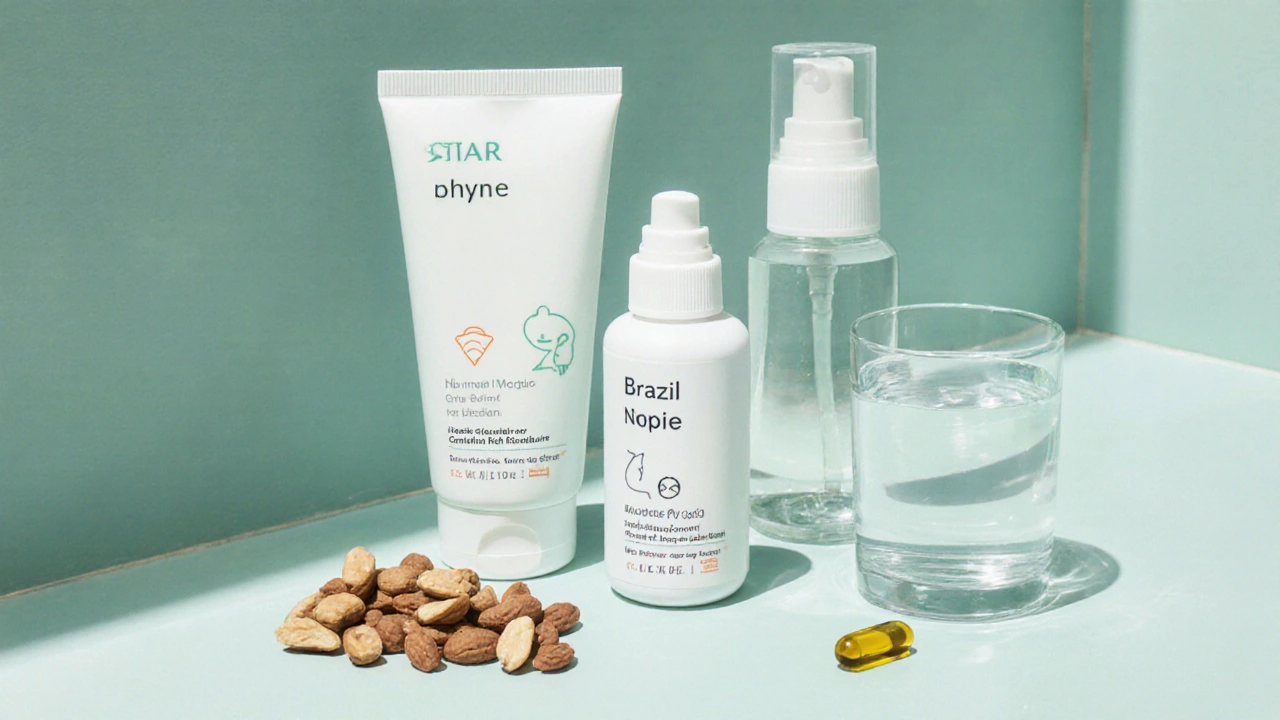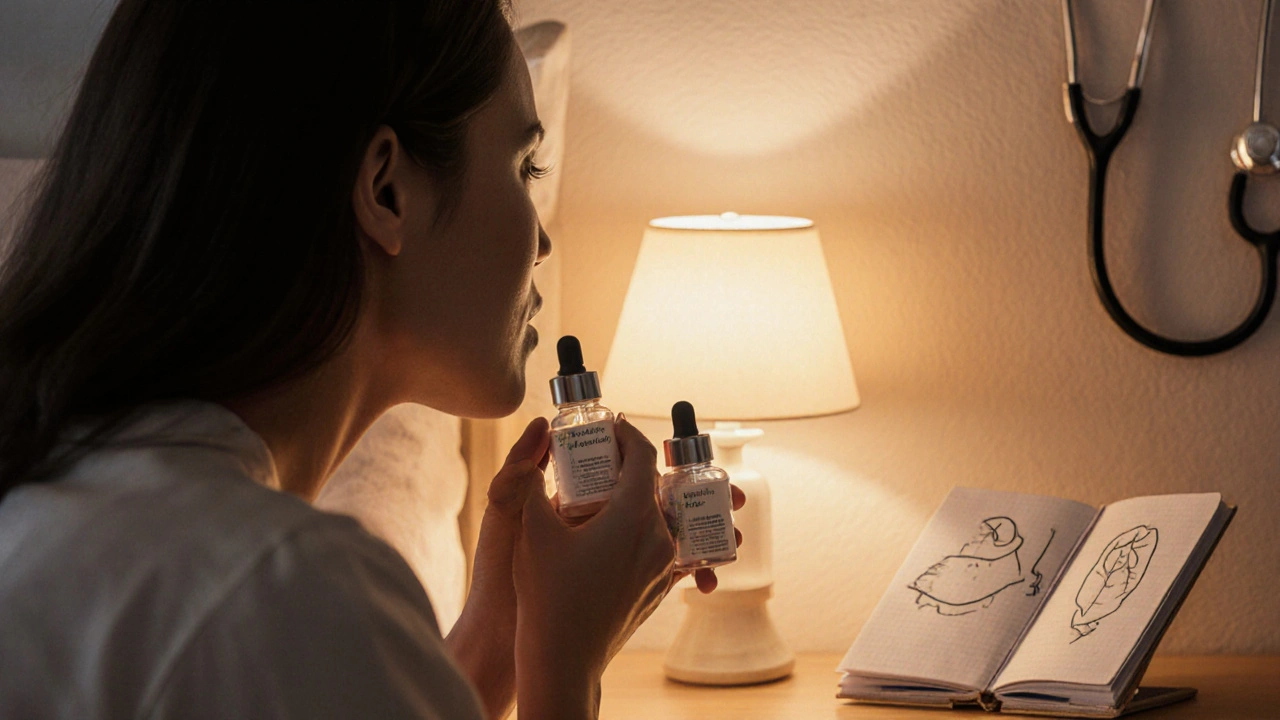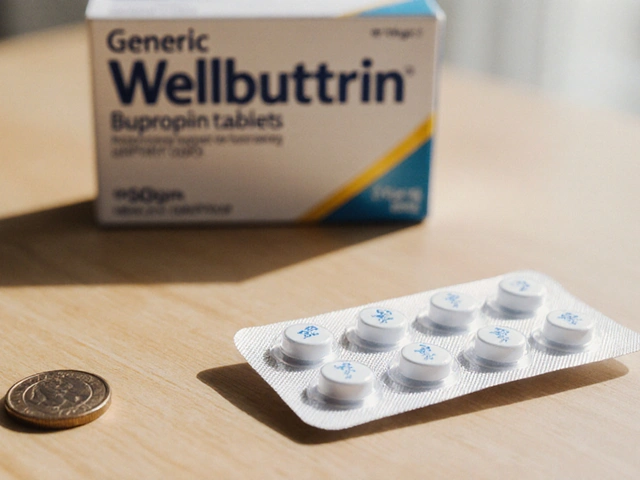Graves' Disease Skin Care Calculator
Your Personalized Skin Care Plan
Living with Graves' disease is a chronic autoimmune disorder that pushes the thyroid to overproduce hormones. While most people link it to weight loss, rapid heartbeat, or eye changes, the skin often shows up on the list of complaints, too. If you’re wondering why your complexion looks dull, dry, or blotchy, and how to fight it, you’ve come to the right place. Below you’ll find practical steps, nutrition pointers, and product recommendations that fit right into a busy life.
Why Graves' Disease Affects Your Skin
Understanding the link helps you target the right solutions. Thyroid hormones regulate metabolism at the cellular level, and an excess (hyperthyroidism) speeds up skin turnover. The result is a thinner epidermis, less oil production, and a higher likelihood of itching, redness, or rashes. Autoimmune activity also triggers inflammation, which can manifest as "pretibial myxedema" - a waxy swelling on the shins that signals deeper systemic issues.
Another piece of the puzzle is Graves' ophthalmopathy, which can cause eyelid retraction and make the eyes appear more prominent. The skin around the eyes becomes more sensitive, so harsh cleansers or makeup can quickly irritate the area.
Core Skincare Principles for Hyperthyroid Patients
Think of skin care as a balancing act - you want to protect the barrier without adding extra stress. Follow these three pillars:
- Gentle Cleansing: Use a sulfate‑free cleanser that respects the skin’s pH. Look for ingredients like glycerin or panthenol which hydrate while they clean.
- Targeted Moisture: Layer a lightweight, fragrance‑free moisturizer within three minutes of washing. Ceramide‑rich formulas help rebuild the lipid barrier that thins out when hormones run high.
- Sun Defense: UV exposure speeds up collagen breakdown, a problem already amplified by thyroid excess. Choose a broad‑spectrum SPF 30+ that feels non‑greasy.

Nutrition & Supplements That Support Skin Health
What you eat feeds the skin from the inside out. Certain nutrients are especially useful for people with Graves' disease:
- Vitamin D: Low levels correlate with autoimmune flare‑ups. Aim for 800-1000 IU daily, or get a blood test to fine‑tune the dose.
- Selenium: This trace mineral can calm thyroid‑related inflammation. Brazil nuts (1-2 per day) provide about 55 µg, meeting the typical recommendation.
- Omega‑3 fatty acids: EPA and DHA from fish oil reduce systemic inflammation and may ease skin itching.
- Hydration: Drinking at least 2L of water daily keeps the epidermis supple, especially when hormone‑driven sweating is frequent.
Talk to your endocrinologist before starting any supplement - interactions with antithyroid meds like methimazole are possible.
Managing Medication Side Effects on the Skin
Common treatments for Graves' disease each have a skin‑related profile:
| Medication | Typical Skin Issue | How to Mitigate |
|---|---|---|
| Antithyroid drugs (methimazole, propylthiouracil) | Rash, itching, rare severe skin necrosis | Apply gentle moisturizer; report severe rash to doctor immediately |
| Beta‑blockers (propranolol) | Cold extremities, occasional dry skin | Use richer night cream; keep hands warm |
| Radioactive iodine (RAI) | Dryness, especially around eyes | Eye drops + barrier‑repair eye cream |
| Thyroidectomy (surgery) | Post‑op scar, altered hormone balance | Silicone scar sheets; monitor hormone replacement and adjust skin routine |
Knowing which drug triggers which skin change lets you act fast rather than waiting for a flare‑up.
Lifestyle Tweaks That Make a Difference
Stress, smoking, and lack of sleep amplify autoimmunity. Simple habits can tone down skin irritation:
- Stress reduction: Daily 10‑minute mindfulness or breathing exercises lower cortisol, a hormone that can worsen skin inflammation.
- Quit smoking: Tobacco worsens Graves' ophthalmopathy and impairs skin healing.
- Sleep hygiene: Aim for 7-8hours; during deep sleep, the skin repairs barrier lipids.

Choosing the Right Skincare Products
When you shop, keep an eye on the ingredient list. Here’s a quick cheat‑sheet:
| Ingredient | Benefit | Potential Concern |
|---|---|---|
| Hyaluronic acid | Locks in moisture without feeling heavy | None for most skin types |
| Niacinamide | Strengthens barrier, reduces redness | Very high concentrations may cause mild tingling |
| Fragrance | - | Common irritant; avoid |
| Retinol | Stimulates collagen, improves texture | Can exacerbate dryness; use every other night |
| Shea butter | Rich occlusive for night repair | May feel too heavy for daytime under makeup |
Pick a cleanser with glycerin, a serum that contains niacinamide, and a night cream rich in ceramides. This combo tackles the three core challenges: barrier loss, inflammation, and moisture depletion.
When to Seek Professional Help
If you notice any of these red flags, schedule an appointment with your dermatologist or endocrinologist:
- Rapidly spreading rash or hives
- Severe itching that disrupts sleep
- Changes in eye appearance, such as bulging or persistent dryness
- Unexplained weight loss or heart palpitations alongside skin issues
Early intervention can prevent long‑term scarring and keep your thyroid under control, which in turn stabilises your complexion.
Frequently Asked Questions
Can Graves' disease cause acne?
Yes. The hormonal surge can increase oil production in some people, leading to clogged pores and breakouts. Opt for a mild salicylic acid cleanser and keep moisturisation light but consistent.
Is it safe to use retinoids while on antithyroid medication?
Generally safe, but start with a low concentration and apply every other night to avoid excess dryness. Monitor your skin’s reaction and discuss any severe irritation with your doctor.
Why does my skin feel tighter after radioactive iodine treatment?
RAI can temporarily reduce tear production and skin moisture, making the face feel tight. Using a hyaluronic‑acid serum and a richer night cream can restore comfort within weeks.
Do I need to avoid sun exposure completely?
No, but daily SPF 30+ is crucial. UV rays accelerate collagen loss, which is already heightened by excess thyroid hormones. Reapply every two hours when outdoors.
Can dietary changes improve both thyroid function and skin?
Absolutely. A balanced diet rich in selenium, vitamin D, omega‑3s, and low‑glycemic carbs supports immune regulation and skin barrier health. Pair nutrition with the skincare steps outlined above for best results.




Michael Coakley
October 6, 2025 AT 12:56Oh great, another skin guide for thyroid drama, because I totally needed that.
ADETUNJI ADEPOJU
October 13, 2025 AT 11:36While the post offers a handy checklist, one must recognize the ethical ramifications of self‑prescribing topical actives without professional oversight. The discourse often neglects the sociocultural determinants that drive both disease perception and consumer behavior. In the realm of autoimmunity, we should prioritize evidence‑based interventions over trendy ingredient hype. Nonetheless, the emphasis on sunscreen is commendable; UV protection remains a universal public health prerequisite.
Janae Johnson
October 20, 2025 AT 10:16Interestingly, the guide pushes SPF like it’s the holy grail, yet many Graves patients actually experience oily skin that tolerates lighter formulations. A mineral‑based SPF with zinc oxide can be less comedogenic than chemical filters. Moreover, the recommendation to avoid retinol outright may be overstated; low‑dose retinoids can modulate keratinization without excessive dryness if paired with robust moisturizers. So, while the advice is solid, a nuanced approach based on individual skin type would be more appropriate.
Kayla Charles
October 27, 2025 AT 07:56Hey everyone, let’s take a moment to acknowledge how overwhelming it can feel when your thyroid decides to go on a roller‑coaster and your skin decides to throw a party of its own. First off, the three‑pillar system-gentle cleansing, targeted moisture, and sun defense-is a fantastic scaffold that anyone can adapt, regardless of the specific medication you’re on.
When it comes to cleansers, think glycerin, panthenol, and the occasional oat extract; these ingredients respect the skin’s natural pH and help keep the barrier intact. If you’re dealing with the dryness that beta‑blockers love to sow, a ceramide‑rich night cream will act like a brick wall against moisture loss.
For those on methimazole or propylthiouracil, a light, fragrance‑free moisturizer with added niacinamide can soothe that itching and reduce any emergent redness.
Now, about water-yes, you’ve heard it a million times, but the research backs it: aiming for at least two liters a day supports epidermal hydration from the inside out, especially when hypermetabolism is making you sweat more than usual.
Don’t forget the power of omega‑3s; fish oil isn’t just for heart health, it also tempers systemic inflammation, which can translate to fewer flare‑ups on the skin.
Selenium, found in a few Brazil nuts a day, is another underrated hero that can calm thyroid‑related inflammation, but keep an eye on dosage if you’re already supplementing.
Sun protection is non‑negotiable. A broad‑spectrum SPF 30+ that feels non‑greasy (think zinc oxide or titanium dioxide in a lightweight base) will guard against the accelerated collagen breakdown that excess thyroid hormones can cause.
If you’re worried about the occasional “tight” feeling after radioactive iodine, a hyaluronic‑acid serum followed by a richer night cream can restore that supple feel within weeks.
Stress management, while sounding like a cliché, truly matters; a quick ten‑minute breathing exercise each morning can lower cortisol, which in turn can reduce skin inflammation.
And finally, if you ever notice a rash that spreads quickly, severe itching that disrupts sleep, or any changes in eye appearance, don’t wait-see a dermatologist or endocrinologist promptly. Early intervention can prevent scarring and keep your complexion on track while you manage your thyroid.
Bottom line: a consistent routine, mindful nutrition, and proactive medical follow‑up are the trio that will keep your skin looking its best, even when your thyroid tries to steal the spotlight.
Paul Hill II
November 3, 2025 AT 06:36I’m on methimazole and the mild moisturizer with ceramides that the article mentions has been a game‑changer for my dry patches. Pair it with a gentle glycerin cleanser and you’ll notice less itching within a week. Also, don’t forget to reapply SPF after you sweat-it wears off quicker than you think.
Stephanie Colony
November 10, 2025 AT 05:16From a standpoint that values national health standards, it’s absurd that many American skincare brands still shove fragrance into “hypoallergenic” formulas. If you’re battling Graves‑related rash, seek out products that proudly label themselves fragrance‑free and prioritize barrier‑repair ingredients like shea butter and niacinamide. Anything less feels like an insult to both your skin and your patriotism.
Abigail Lynch
November 17, 2025 AT 03:56Some people think the government is hiding the “real” cure for thyroid skin issues, but honestly, the best we have is good old moisturization and sunlight avoidance. If you’re skeptical, just try a simple oat‑based cream and see if the itching eases.
David McClone
November 24, 2025 AT 02:36The article nails the basics, but let’s not pretend that every Graves patient will react the same way to a given ingredient. For instance, retinol can be a double‑edged sword-use it sparingly and follow up with a humectant like hyaluronic acid to keep the skin from turning into a desert.
Jessica Romero
December 1, 2025 AT 01:16Appreciate the thoroughness here; the step‑by‑step breakdown is especially useful for newcomers who might feel overwhelmed by medical jargon. One practical tip: keep a small travel‑size moisturizer in your bag so you can reapply after hand‑washing, which is a frequent trigger for dryness in hyperthyroid patients. Also, consider rotating between a lightweight daytime lotion and a richer night cream to avoid over‑loading your pores.
Michele Radford
December 7, 2025 AT 23:56While the guide is generally sound, it glosses over the rare but severe cutaneous necrosis that can occur with propylthiouracil. Such a life‑threatening side effect warrants a stronger warning and a recommendation to discontinue the drug at the first sign of ulcerative lesions.
Mangal DUTT Sharma
December 14, 2025 AT 22:36Reading through this reminded me of the countless patients who feel isolated by their skin changes. 🌿 Remember, you’re not alone-many have walked this path and found relief through consistent hydration, balanced nutrition, and gentle skincare. 🌞 Embrace the routine, celebrate small improvements, and keep communicating with your healthcare team. ❤️🩹
Gracee Taylor
December 21, 2025 AT 21:16I think it’s important to recognize that every individual’s experience with Graves is unique, and a one‑size‑fits‑all approach rarely works. Let’s keep sharing our personal tweaks and successes so the community can build a more comprehensive toolkit together.